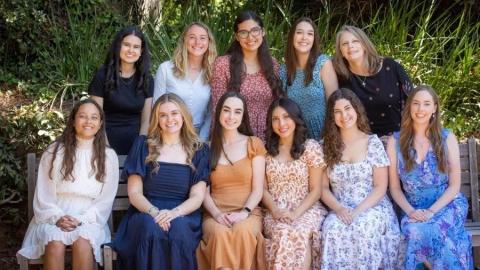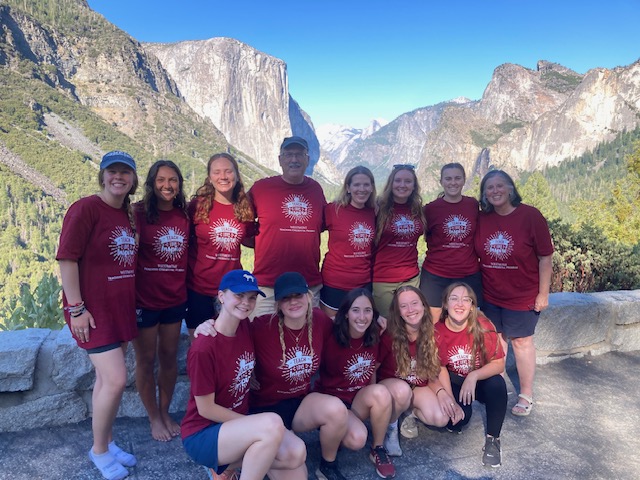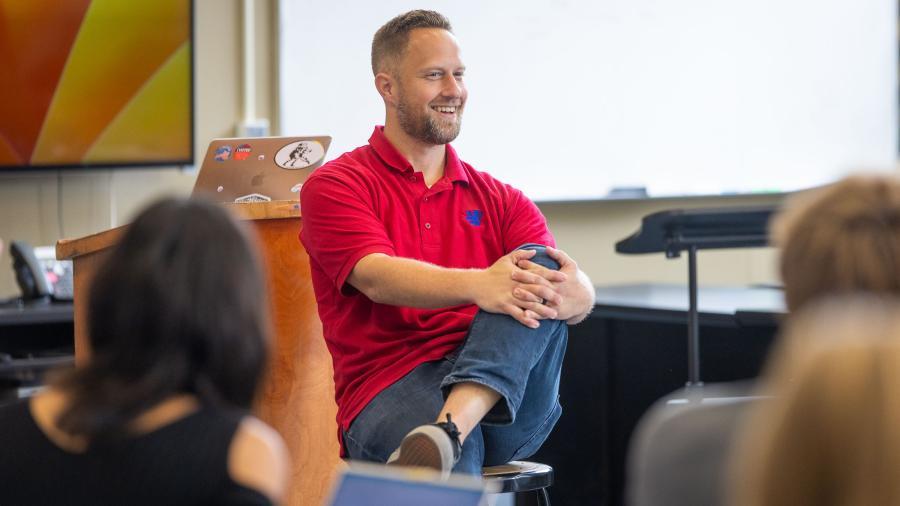Education Teaching Credential
Become a knowledgeable, caring, Christian educator through our rigorous, highly practical and professional program. You'll learn from full-time professors with K-12 experience as you develop essential skills and attitudes to succeed as a teacher. Westmont’s stellar reputation opens doors for you to observe, teach, and invest in diverse schools. You enter our professional program with a collegial cohort, taking classes in the fall semester and student teaching in the spring.
Westmont College Teacher Education Program graduates have excellent passage rates on the California Teacher's Exam! See our passage rates here.
Scholarships
Students may apply for financial aid. Important information for applying for financial aid is available on the Financial Aid page. Students may be eligible for additional scholarships from the Credential Program. During the Spring Semester of the credential year, candidates holding a BA or BS, who live off campus, are eligible for a scholarship equal to 55% of tuition.
Fast-Track Options
Elementary candidates major in Liberal Studies. Working closely with a Liberal Studies advisor, students can complete a B.A. and earn a California Multiple Subject Preliminary Teaching Credential in four years.
Secondary candidates major in Art, English, History, Social Sciences, Physical Education/Kinesiology, Music, Mathematics, the Sciences (Biology, Chemistry, Physics) or Spanish. Working closely with a faculty advisor in their major and an education faculty advisor, students can complete a B.A. or B.S. and a California Single Subject Preliminary Teaching Credential in four years.
Sample Fast-Track Plans
- Art
- English
- History/Social Science
- Liberal Studies
- Mathematics
- Music
- Physical Education/Kinesiology
- Science - Biology
- Science - Chemistry
- Science - Physics
- Spanish
Post-Degree Option
This post-baccalaureate program requires prior completion of a B.A. or B.S.
A program advisor works closely with applicants through the admissions process and helps students complete the prerequisite courses/requirements.
Education Minor
The Education Minor is for students majoring in disciplines outside of the Liberal Studies major (art, English, history/social science, physical education/kinesiology, mathematics, science—biology, chemistry, and physics—and Spanish) that are interested in K-12 education and/or are considering pursuing a teaching credential for junior high or high school. The Education Minor includes all of the prerequisite courses for Westmont's Credential Program. Please contact the Education Faculty for advising and next steps.
Minor Course Requirements (20-22 units)
- ED 100/101 Explorations in Teaching (4)
- ED 160/161 Technology in the Classroom (2)
- ED 105 Cultural Diversity (4)
- ENG 106 Language Acquisition (4)
- KNS 156 Health in the Classroom (2)
- ED 130 Special Education in the Classroom (2)
- Elective upper-division course approved by the Education Department Chair (2-4)
*It is important to note that a minor would not apply to Liberal Studies or Music Education Majors
Non-Discrimination Policy
Westmont's credential program aligns with the institutional Non-Discrimination Policy shown on the institutional webpage.
Teacher Credential Coursework
Prior to your credential year take as many of the following requirements as possible, at Westmont or elsewhere.
-
ED 100/101:Explorations in Teaching (4)
-
ED 105: Perspectives on Cultural Diversity and Education (4)
-
ED 160/161: Technology for the Classroom Teacher (2)
-
ENG 106: Language Acquisition (4)
-
KNS 156: Health for the Classroom Teacher (2)
Fall Semester (18 units)
-
ED 110: Educational Psychology (4)
-
ED 120: Social Studies and Science Instruction (4)
-
ED 130: Special Education for the Classroom (2)
-
ED 150: Math Instruction (4)
-
ED 170: Reading and Language Arts Instruction (4)
Spring Semester (15 units)
-
ED 190: Student Teaching (12)
-
ED 195: Student Teaching Seminar —Elementary (3)
Fall Semester (18 units)
-
ED 101: Explorations in Teaching (4)
-
ED 111: Educational Psychology (4)
-
ED 130: Special Education (2)
-
ED 171: Content Area Literacy (4)
One of the following:
-
ED 122: English Curriculum and Instruction (4)
-
ED 123: History/Social Science Curriculum and Instruction (4)
-
ED 124: Mathematics Curriculum and Instruction (4)
-
ED 125: Science Curriculum and Instruction
-
ED 126: World Language (Spanish) Curriculum and Instruction (4)
-
ED 127: Art Curriculum and Instruction (4)
-
ED 128: Music Curriculum and Instruction (4)
-
ED 129: Physical Education Curriculum and Instruction (4)
Spring (15 units)
-
ED 191: Student Teaching (12)
-
ED 196: Student Teaching Seminar —Secondary (3)
FAQ
The short answer—generally speaking—is yes.
Many states have what are called reciprocity agreements that establish mutual recognition of the licenses and teacher training acquired outside the teaching candidate’s home state. Traditionally, California has been among the states with the highest number of reciprocity agreements. In other words, a teaching credential from California is widely recognized elsewhere. Whether or not your state has a specific reciprocity agreement with California, you will in all likelihood be allowed to teach back home for a fixed length of time under some sort of provisional license granted by that state on the basis of the preliminary California credential you earned through Westmont. Then once you have a job, you work with the teacher certification office in your home state toward a full credential.
If you know now that you want to teach in a particular state, it may be helpful to contact the specific office of teacher certification for current requirements—see Useful Links on the Department’s web page. Remember, however, that state requirements are often in a state of re-negotiation, and it may not be possible to know exactly where you stand in another state until you have your credential from California in hand.
In many cases, yes. Students who enter college with an unusually strong academic background, who plan carefully from the start, and who are willing to take summer classes may be able to participate in a wide variety of programs—potentially including the Europe semester.
It depends partly, of course, on what specific off-campus program you are considering. A program at a sister liberal arts college where you are able to take classes parallel to those required at Westmont will be more feasible for a broader range of students than a less traditional off-campus program.
Bear in mind that Westmont offers a number of exciting off-campus and international programs during the summer months—programs that are less apt to complicate your schedule than those offered during the academic year. Students who are unable to participate in the Europe semester often enroll in Westmont’s Europe Mayterm.

Allison Judy ’19 discovered that Westmont prepared her in more than one way to become a teacher. “The faith-filled teachings and relationships with friends and teachers cultivated the compassion and perspective necessary for approaching teaching from the heart,” she says.
During the pandemic, nine Westmont student teachers used their creativity during this unique and challenging season while learning to teach. Placed in four schools in the Santa Barbara Unified and Hope School Districts, the students took credential courses at Westmont, both online and in person, while collaborating with their cooperating teachers in a remote K-12 classroom.

Anna Luce '22, a liberal studies major who values culture and language, hopes to incorporate both into her future teaching career.

Linda Ngo, one of the first recipients of the Young Life Urban Leadership Scholarship, graduated from Westmont as the top student in liberal studies for 2021.

Marianne D’Emidio-Caston, who served the local education community for more than three decades, received the Westmont Education Department’s 2021-22 Excellence in Education Award.

Westmont’s Education Department honored its eight elementary and three secondary student teachers, who all earned California Preliminary Credentials, at the Celebration of Teaching event April 26 on campus.

